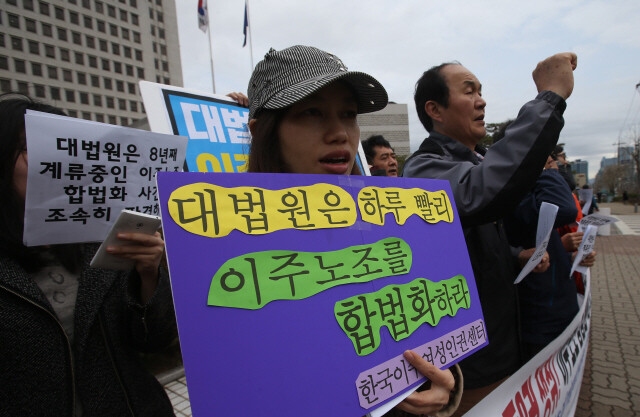hankyoreh
Links to other country sites 다른 나라 사이트 링크
Migrants Trade Union stuck waiting more than ten years to be recognized

Two thousand nine hundred fifty-six days.
That’s how long a case filed against the Seoul office of the Ministry of Employment and Labor by the Seoul/Gyeonggi/Incheon Migrants’ Trade Union (MTU) has been held up in the Supreme Court. The suit contesting the rejection of the union’s establishment notice was the court’s oldest unsettled case on Apr. 2.
The MTU turns ten years old this month, with a founding date of Apr. 24, 2005. The establishment notice was filed with the regional ministry just after the founding, but eventually rejected because some of the union members were undocumented migrants. The MTU immediately filed suit, losing its first trial but winning its appeal. The appellate court declared at the time that “the right to union establishment must be guaranteed even for undocumented migrant workers.” In Feb. 2007, the regional ministry appealed. A ruling has yet to be made in the more than eight years since then.
While the Supreme Court has been marking time, the MTU has been going through its share of ordeals. Three union presidents were arrested and deported for illegal sojourn after being elected. In 2011, it got its first legal migrant president, a worker who had entered South Korea through the Employment Permit System. But that president too was given a deportation order for falsifying a workplace alteration notice, and returned home during trial the following year.
The current president is Udaya Rai, a Nepalese worker who also has legal migrant status. The number of MTU members has swelled from 80 at the time of establishment to around 500 today. The increase is said to be the result of counseling efforts on issues such as unpaid wages and toxic provisions in the Employment Permit System that prevent workers from changing workplaces without their current employer’s permission.
The union has been kept waiting more than nine years for legal status, but the number of migrant workers joining company and industry unions continues to grow. The Gyeongju chapter of the Korean Metal Workers’ Union (KMWU) has around sixty migrant workers registered for three automobile parts companies. Domestic and international members alike have joined chapters established at workplaces in the past two years.
“A lot of the insults and slights against migrant workers have gone away now that they’re seen as fellow union members,” explained a source with the Gyeongju KMWU chapter. “There’s also been a wage increase effect of about two to four million won (US$1,830--3,660) a year because of union membership.”
The MTU’s argument is that the current situation leaves no reason to block its legal status.
“All workers have the right to join a union, and the South Korean Constitution and labor law guarantee it,” said Rai.
“While workers can join company and industry unions, most migrant workers work at small-scale workplaces,” he added. “Only when legal status is granted to a general union like the MTU will we get collective bargaining rights for individual workplaces and promote the labor rights of migrant workers.”
A Supreme Court source said on Apr. 2 that a decision may be coming.
“There are a lot of complex legal issues involving things like whether to recognize basic Constitutional rights for illegal workers, and it’s taken some time to analyze overseas precedents,” the source said. “The examination is almost in its final stages now.”
By Park Tae-woo, staff reporter
Please direct questions or comments to [english@hani.co.kr]
Editorial・opinion
![[Column] Has Korea, too, crossed the Rubicon on China? [Column] Has Korea, too, crossed the Rubicon on China?](https://flexible.img.hani.co.kr/flexible/normal/500/300/imgdb/original/2024/0419/9317135153409185.jpg) [Column] Has Korea, too, crossed the Rubicon on China?
[Column] Has Korea, too, crossed the Rubicon on China?![[Correspondent’s column] In Japan’s alliance with US, echoes of its past alliances with UK [Correspondent’s column] In Japan’s alliance with US, echoes of its past alliances with UK](https://flexible.img.hani.co.kr/flexible/normal/500/300/imgdb/original/2024/0419/2317135166563519.jpg) [Correspondent’s column] In Japan’s alliance with US, echoes of its past alliances with UK
[Correspondent’s column] In Japan’s alliance with US, echoes of its past alliances with UK- [Editorial] Does Yoon think the Korean public is wrong?
- [Editorial] As it bolsters its alliance with US, Japan must be accountable for past
- [Guest essay] Amending the Constitution is Yoon’s key to leaving office in public’s good graces
- [Editorial] 10 years on, lessons of Sewol tragedy must never be forgotten
- [Column] A death blow to Korea’s prosecutor politics
- [Correspondent’s column] The US and the end of Japanese pacifism
- [Guest essay] How Korea turned its trainee doctors into monsters
- [Guest essay] As someone who helped forge Seoul-Moscow ties, their status today troubles me
Most viewed articles
- 1[Column] The clock is ticking for Korea’s first lady
- 2Samsung barricades office as unionized workers strike for better conditions
- 3[Editorial] When the choice is kids or career, Korea will never overcome birth rate woes
- 4[News analysis] After elections, prosecutorial reform will likely make legislative agenda
- 5S. Korea, Japan reaffirm commitment to strengthening trilateral ties with US
- 6All eyes on Xiaomi after it pulls off EV that Apple couldn’t
- 7After 2 months of delayed, denied medical care, Koreans worry worst may be yet to come
- 8US overtakes China as Korea’s top export market, prompting trade sanction jitters
- 9[Column] Has Korea, too, crossed the Rubicon on China?
- 10Hong Se-hwa, voice for tolerance whose memoir of exile touched a chord, dies at 76